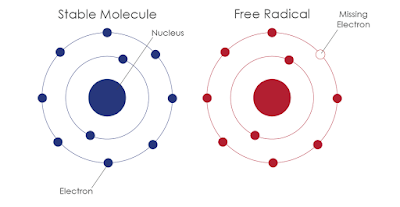Antioxidants and the Immune System
We've heard the word before: antioxidants. Often times uttered in the same sentence as such vitamins as Vitamin C, Vitamin E, and Vitamin A. To the uneducated, antioxidants are sometimes utilized as a medicine of sorts-only consumed (oftentimes in inappropriate quantities) after someone has already gotten sick and they consume antioxidants because they believe that they have healing properties.
But that's not really how antioxidants work. Antioxidants work to stabilize harmful free-radicals that bring about degradation of cells in the human body. We tend to know of free-radicals, but we often don't really understand how they work and, in turn, how antioxidants work to nullify them.

Seen above is a side-by-side comparison of a stable molecule and a free-radical. A free-radical is a molecule that is missing an electron, and attacks nearby molecules to satisfy the need for this empty slot. This is why free-radicals degrade tissue; free-radicals are literally tearing tissue apart on the molecular level.
So how do antioxidants play a role in stopping this from happening? In short, antioxidants simply have an electron to give. Remember, a free-radical is only hazardous because it has an unpaired electron and is looking to steal one from certain tissue cells in our bodies. But antioxidants function by simply giving an electron to this unpaired electron, thereby stabilizing the molecule.
So, do antioxidants cure illness? The common cold? What about more serious viral infections like SARS? Well, no. They don't provide a cure. However, several studies show that consistent intake of antioxidants as a preparatory measure may help to prevent such illnesses. There are also studies that suggest antioxidant intake may improve certain immune responses such as slowing the production of cancer cells.
If you want to be a healthy individual, and you want to utilize the benefits that antioxidants offer, consume the appropriate amounts of Vitamin A, C, and E preferably in from your diet.
CB
https://www.ncbi.nlm.nih.gov/pubmed/8227682
But that's not really how antioxidants work. Antioxidants work to stabilize harmful free-radicals that bring about degradation of cells in the human body. We tend to know of free-radicals, but we often don't really understand how they work and, in turn, how antioxidants work to nullify them.

Seen above is a side-by-side comparison of a stable molecule and a free-radical. A free-radical is a molecule that is missing an electron, and attacks nearby molecules to satisfy the need for this empty slot. This is why free-radicals degrade tissue; free-radicals are literally tearing tissue apart on the molecular level.
So how do antioxidants play a role in stopping this from happening? In short, antioxidants simply have an electron to give. Remember, a free-radical is only hazardous because it has an unpaired electron and is looking to steal one from certain tissue cells in our bodies. But antioxidants function by simply giving an electron to this unpaired electron, thereby stabilizing the molecule.
So, do antioxidants cure illness? The common cold? What about more serious viral infections like SARS? Well, no. They don't provide a cure. However, several studies show that consistent intake of antioxidants as a preparatory measure may help to prevent such illnesses. There are also studies that suggest antioxidant intake may improve certain immune responses such as slowing the production of cancer cells.
If you want to be a healthy individual, and you want to utilize the benefits that antioxidants offer, consume the appropriate amounts of Vitamin A, C, and E preferably in from your diet.
CB
https://www.ncbi.nlm.nih.gov/pubmed/8227682

.png)
Comments
Post a Comment